D1054
Dihydrorhodamine 123
≥95% purity, powder
Synonym(s):
DHR 123; Methyl 2-(3,6-diamino-9H-xanthen-9-yl)benzoate; Benzoic acid, 2-(3,6-diamino-9H-xanthen-9-yl)-, methyl ester
About This Item
Recommended Products
product name
Dihydrorhodamine 123, ≥95%
Quality Level
Assay
≥95%
form
powder
color
pink
solubility
DMSO: >5 mg/mL
application(s)
diagnostic assay manufacturing
hematology
histology
storage temp.
−20°C
SMILES string
COC(=O)c1ccccc1C2c3ccc(N)cc3Oc4cc(N)ccc24
InChI
1S/C21H18N2O3/c1-25-21(24)15-5-3-2-4-14(15)20-16-8-6-12(22)10-18(16)26-19-11-13(23)7-9-17(19)20/h2-11,20H,22-23H2,1H3
InChI key
FNEZBBILNYNQGC-UHFFFAOYSA-N
Looking for similar products? Visit Product Comparison Guide
General description
Application
Biochem/physiol Actions
Substrates
Storage Class Code
11 - Combustible Solids
WGK
WGK 3
Flash Point(F)
Not applicable
Flash Point(C)
Not applicable
Personal Protective Equipment
Choose from one of the most recent versions:
Certificates of Analysis (COA)
Don't see the Right Version?
If you require a particular version, you can look up a specific certificate by the Lot or Batch number.
Already Own This Product?
Find documentation for the products that you have recently purchased in the Document Library.
Customers Also Viewed
Articles
Cellular oxidative stress is countered by enzymatic scavengers and antioxidant modulators against reactive oxygen species damage.
Cellular oxidative stress is countered by enzymatic scavengers and antioxidant modulators against reactive oxygen species damage.
Cellular oxidative stress is countered by enzymatic scavengers and antioxidant modulators against reactive oxygen species damage.
Cellular oxidative stress is countered by enzymatic scavengers and antioxidant modulators against reactive oxygen species damage.
Our team of scientists has experience in all areas of research including Life Science, Material Science, Chemical Synthesis, Chromatography, Analytical and many others.
Contact Technical Service










